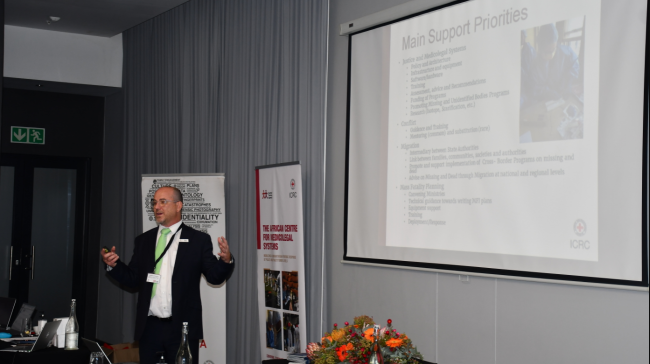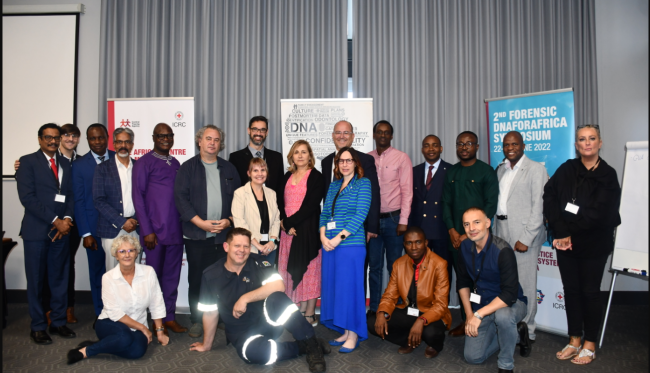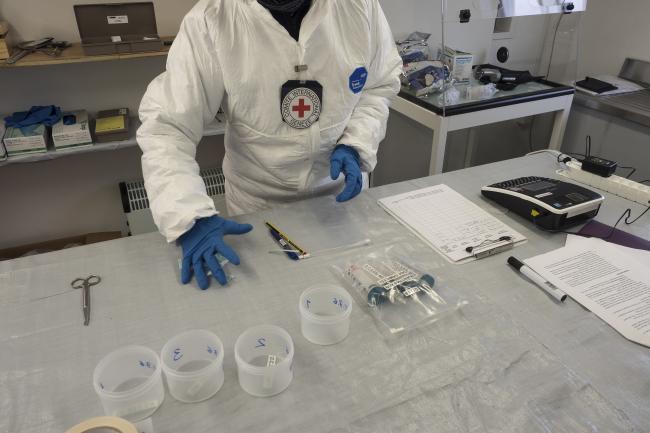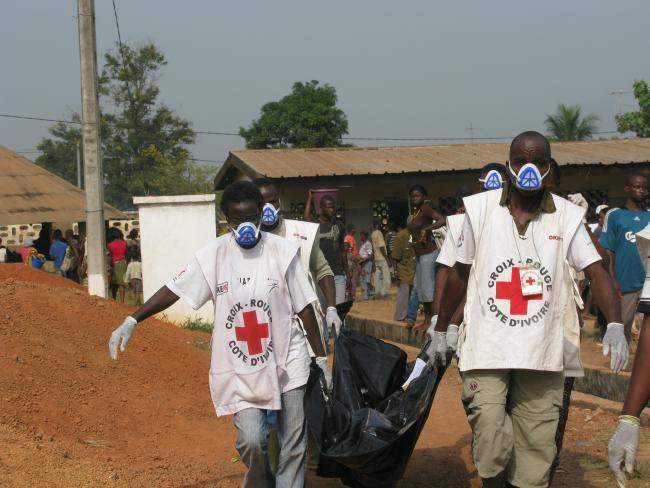تعزيز قدرات الطب الشرعي والنظم الطبية-القانونية في أفريقيا
انطلق المركز الأفريقي للنظم الطبية-القانونية رسميًا في مدينة بريتوريا بجنوب أفريقيا في 8 تشرين الثاني/نوفمبر 2022، ما يشكل خطوة كبرى للأمام في الجهود الرامية إلى تعزيز قدرات الطب الشرعي والنظم الطبية-القانونية في أفريقيا.
والمركز بصدد إنشاء شبكة من صناع السياسات والممارسين في مجال الطب الشرعي والنظم الطبية-القانونية لتعزيز الخبرات الفنية والموارد في هذين المجالين، سواء في المنطقة أو على مستوى العالم. والهدف من المركز هو توعية صناع السياسات، وتحسين الاستجابة المهنية للممارسين في مجال النظم الطبية-القانونية، وتبادل الدروس المستفادة وأفضل الممارسات عن طريق استضافة فعاليات إقليمية، وتنسيق جهود مجتمعات السياسات والممارسات الأفريقية والدولية المعنية

المهمة
مهمة المركز الأفريقي للنظم الطبية-القانونية التابع للصليب الأحمر والهلال الأحمر هي دعم منطقة أفريقيا بتلبية احتياجات السكان المتضررين من النزاعات المسلحة والكوارث والهجرة، وتحسين برامج الخدمات العامة متعددة التخصصات من خلال مبادئ وممارسات الطب الشرعي في مجال العمل الإنساني التي تطبقها وتمارسها الأوساط القضائية ومجتمعات النُظم الطبية-القانونية. فنحن نؤمن بأننا نستطيع بالعمل معًا تحسين النُظم الطبية-القانونية الأفريقية كافة، ومساعدة العائلات المتضررة التي فقدت ذويها. وبإمكان المركز الأفريقي للنظم الطبية-القانونية تمكين الأفراد على المستويات كافة في النُظم القضائية والطبية-القانونية من تبني المبادئ والممارسات الإنسانية لتحقيق صالح كل الضحايا في جميع الأحوال، عن طريق مد جسور التعاون بين المنظمات الدولية وتنسيق جهودها.
African Centre for Medicolegal Systems Library

Military Personnel Identification Project
The ICRC’s Military Personnel Identification Project is a multi-phase 3-year initiative, launched in 2024, by the ICRC’s African Centre for Medicolegal Systems (ACMS) and the Red Cross Red Crescent Missing Persons Centre.
الأنشطة
شرع المركز الأفريقي للنظم الطبية-القانونية في حزيران/يونيو 2022 في بذل جهود غير رسمية للتأثير في مجالات الاهتمام في القارة عن طريق التعاون مع مؤسسة DNAforAfrica خلال ندوة أقيمت في نيروبي. وقد برهن العمل مع مؤسسة DNAforAfrica على قيمة التعاون الذي تنتهجه اللجنة الدولية مع المنظمات والمؤسسات الأخرى على المستوى الإقليمي، بغرض زيادة الوعي وإقامة برامج تدريبية بشأن أعمال الطب الشرعي في مجال العمل الإنساني، وهي الأنشطة التي يستفيد منها جمهور واسع من العاملين في الطب الشرعي في أفريقيا.

اتحاد المنظمات الدولية
استضاف المركز الأفريقي للنظم الطبية-القانونية في تشرين الثاني/نوفمبر 2022 بعد انطلاقته الرسمية مباشرة اجتماعه الأول لاتحاد المنظمات الدولية الذي تناول على مدار يومين بناء قدرات نظم العدالة والنظم الطبية-القانونية. وقد جمع الاتحاد ممثلين عن هيئات إقليمية ودولية مختلفة، من بينها وحدة العلوم الطبية والتقنية الشرعية التابعة للجنة الدولية للصليب الأحمر ومكتب الأمم المتحدة المعني بالمخدرات والجريمة ومفوضية الاتحاد الأفريقي والإنتربول، لمناقشة أوجه التعاون الممكنة بين الهيئات في مجال بناء قدرات الطب الشرعي والنظم الطبية-القانونية في أفريقيا. وقد التزم ممثلو مختلف الهيئات المشاركة بتحسين سبل التعاون والتنسيق في مجال بناء قدرات نظم العدالة والنظم الطبية-القانونية في أفريقيا.
الأكاديمية الأفريقية لعلوم الطب الشرعي
عقد المركز الأفريقي للنظم الطبية-القانونية كذلك اجتماعًا لفريق عامل في كانون الأول/ديسمبر 2022، لبحث خطط إنشاء أكاديمية أفريقية لعلوم الطب الشرعي. تطمح هذه الأكاديمية لأن تكون رابطة مستدامة ومهنية لممارسي علوم الطب الشرعي، مهمتها تحقيق الاتساق وتعزيزه في ممارسات الطب الشرعي في أفريقيا، وإضفاء مصداقية على مجتمع الطب الشرعي القوى وإبراز دوره في أفريقيا، وتعزيز الخبرة الفنية الأفريقية وتحسين المعايير المهنية والشهادات واللوائح التنظيمية والاعتماد في كل تخصصات علوم الطب الشرعي. وستكون الأكاديمية المؤسسة الأولى من نوعها في القارة الأفريقية، وستصبح منبرًا فريدًا لتبادل المعارف والخبرات في علوم الطب الشرعي. وسيُعلن عن الأكاديمية رسميًا في آذار/مارس 2023 في المؤتمر الدولي للجمعية الأفريقية للطب الشرعي في مدينة كيغالي برواندا.
Training: Forensic Human Identification Examinations in Mortuaries
Forensic Human Identification Examination in Mortuaries is a training tool created to show why comprehensive examination of unidentified bodies is necessary.
Activities include observing, documenting, photographing, fingerprinting, conducting dental examinations, performing X-rays and collecting samples. The aim is to ensure that identification will be possible using a multidisciplinary approach in the future, regardless of the state or condition of the body. All unidentified human remains should undergo examination prior to their interim or final burial.
The training tool also addresses the importance of showing dignity and respect in the examination process, highlights the importance of engaging with families of missing persons to obtain the personal information needed for identification, and emphasizes the authorities’ responsibility to protect data and samples.
The training tool has been created to inform first- and secondary-response practitioners to follow a systematic approach. It is also aimed at students in law, health, forensic, policing and disaster management faculties; police, civil defense and military colleges; and staff and volunteers working for civil society organizations who participate in the recovery and management of the dead and need to understand the role and functions of the medicolegal system – a system which benefits from professional recovery efforts and death scene management, and is seriously compromised by poor practices.
The training video comprises 14 chapters that can be individually shown to meet training curricula and subject-matter instruction and discussions.
CAUTION: GRAPHIC CONTENT
ACMS in the Media

FLOOD MOP-UP OPERATIONS: PROCESS OF IDENTIFYING LOVED ONES (NEWZROOM AFRIKA)
Cato Crest flood victims are calling on the eThekwini Municipality to make good on its promise regarding rebuilding efforts. Officials visited the area to assess the damage days after seven people lost their lives due to heavy rain and subsequent flooding. Red Cross Forensic Manager Stephen Fonseca unpacks how families can start identifying loved ones.

Podcast: Channel Africa
Forensic Manager Stephen Fonseca discusses DNA profiling
Africa regional forensic manager for the International Committee of the Red Cross, Stephen Fonseca, joins On The Move in studio to speak about DNA profiling and forensics in the humanitarian efforts environment.

Podcast: The Talking Point
Identification of unknown bodies
Guest(Studio): Stephen Fonseca – Manager for the African Centre for Medicolegal Systems at the ICRC in Southern Africa – It’s a network of forensic practitioners across the African continent
The Gauteng Department of Health has urged those with missing family members to come forward as more than 900 unidentified bodies lie in the province’s mortuaries. The department’s forensic pathology services (FPS) in Gauteng have 938 unclaimed and unidentified bodies across their 11 mortuaries. We thought to use this opportunity to educate ourselves around these processes and also for those foreign national who pass away in the country as to how their families can claim them. One of the cases that is dominated the news is how Dr Nadipha allegedly stole three bodies, also how it was assumed that the body that burnt in the prison cell is that of Thabo Bester, the big question is how can something like this happen and what is the role of forensics in all of this?

